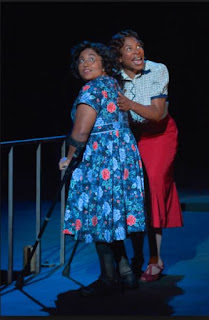Theater: A Provocative Glass Menagerie at California Shakespeare Theater, Orinda
The Glass Menagerie by Tennessee Williams
California Shakespeare Festival, Moraga California
Directed by Lisa Portes
July 29, 2017
The California Shakespeare Theater has been performing summer outdoor theater in an informal setting in the often-chilly East Bay hills since 1974. The company often transcends the normal summer regional theater stereotype with edgy and provocative performances of modern and classical plays. This summer’s performances of Tennessee Williams’ The Glass Menagerie (1944) would seem unlikely for outdoor theater at first glance. Williams’s plays live in interior psychological spaces, not the great outdoors. Yet this performance, ornamented by bundled spectators, windy gusts, coyote howls, and owl hoots, worked. This was largely due to a fine cast who avoided outdoor shouting/declaiming, a relatively intimate venue which used a good amplification system, and fine direction by Lisa Portes, a leader in national Latina/Latino directing and faculty member at DePaul University.
California Shakespeare Festival, Moraga California
Directed by Lisa Portes
July 29, 2017
The California Shakespeare Theater has been performing summer outdoor theater in an informal setting in the often-chilly East Bay hills since 1974. The company often transcends the normal summer regional theater stereotype with edgy and provocative performances of modern and classical plays. This summer’s performances of Tennessee Williams’ The Glass Menagerie (1944) would seem unlikely for outdoor theater at first glance. Williams’s plays live in interior psychological spaces, not the great outdoors. Yet this performance, ornamented by bundled spectators, windy gusts, coyote howls, and owl hoots, worked. This was largely due to a fine cast who avoided outdoor shouting/declaiming, a relatively intimate venue which used a good amplification system, and fine direction by Lisa Portes, a leader in national Latina/Latino directing and faculty member at DePaul University.
California Shakespeare Like all great plays, The
Glass Menagerie is open to interpretation. The faded southern belle Amanda
Wingfield (marvelously played by Karen Aldridge) represents anyone whose
memories exceed their accomplishments, as well as the mother who puts these
deferred expectations on their children (she is the dramatic equivalent of Mama
Rose in Gypsy). Her crippled daughter
Laura responds by withdrawing inwards to her world of glass animals and
fantasy, while her son Jim chronically underachieves, endlessly fleeing to the
movies, and finally leaves his needy family. The unique aspect of Portes’
conception of the play was in using black actors not just as gender-blind
casting, but to add an overtone not present in the expected white southern
characters. The preliminary note in the program gave some history of the <1%
of black families in early twentieth century USA who were wealthy/comfortable,
and strove for status and their children’s success just as the white upper
middle class did. Such black families were often criticized for parroting their
white “peers” despite experiencing equal segregation, staging all-black
cotillions and other typical Victorian age social events in a unique bubble. With
this history in mind, this black Amanda’s nostalgia for the “slaves” who served
her in her southern past and for the famous 17 gentleman callers in the fabled
evening of her past seem less jarring. Though not a part of Williams’ conception,
this black Menagerie provoked many overtones based on what we know about early
twentieth century prejudice towards black people. How much of this Amanda’s
projection on her daughter Laura is based on her individual failings, and how
much on societal prejudice? Is the crippled Laura’s failure to thrive outside
her home due to her individual insecurity and paralyzing lack of confidence, or
also due to society’s response to a disabled black girl? And how much of son Jim’s
diffuseness and lack of career focus is his own and how much due to the
difficulty of young black men to succeed in the American middle class? The Glass Menagerie is certainly at
heart a play about painful human individual frailty and failing, but surprisingly
this social/societal overlay did not dilute the message, instead raising all
sorts of questions in my mind that a traditional white cast would not have
done.
Like the uncompromising Sam Gold production this year on Broadway,
Portes chose a disabled actress to play Laura. Here the excellent Phoebe
Fico, using bilateral elbow crutches and wearing homely print dresses, plays Laura not as the usual beautiful-but-compromised
young lady but as a clearly stunted average girl who has been crippled by her
isolation from society. Despite all her hectoring, Amanda has not integrated
Laura into the world, and the result here smacks of child abuse. In this
setting, all of Amanda’s grandiose hopes for her seem not just vain but cruel.
Aldridge’s Amanda was a powerful, dominant portrayal, younger than sometimes
seen, and with a more vivacious charm that seemed less pathetic than it often
does. This is no aged doyenne, but a still-attractive woman trying much too
hard. Rafael Jordan as Jim was somewhat diffuse, and mostly got out of the way
of the women, as does his character. All these choices made this seem a more
normal family than usual, not a group to put under a microscope but rather to
reflect our and society’s failings. It was less big and "operatic" than usual, but the more restrained experience had its own strengths. Director Portes should be praised for
pulling this off. This Menagerie was not a gimmick but a riff on a great play
that brought it new relevance and insight into our own era.

Comments
Post a Comment